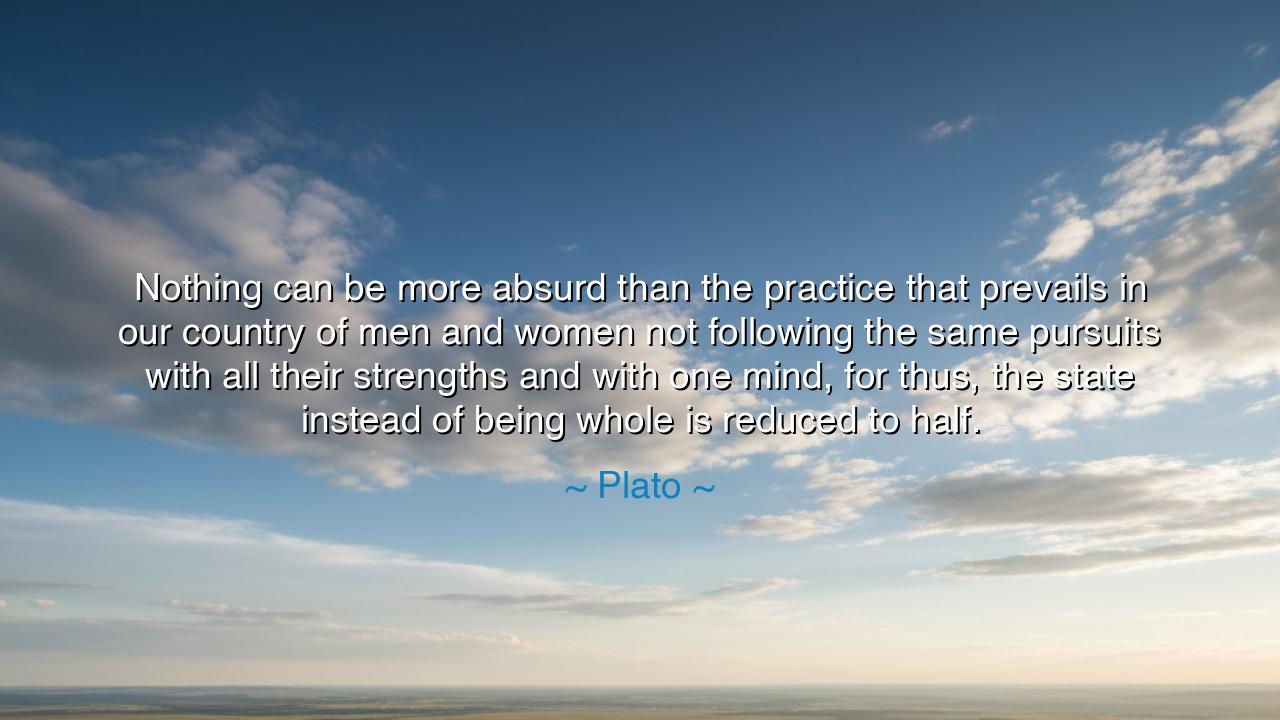
Nothing can be more absurd than the practice that prevails in
Nothing can be more absurd than the practice that prevails in our country of men and women not following the same pursuits with all their strengths and with one mind, for thus, the state instead of being whole is reduced to half.






The words of Plato, “Nothing can be more absurd than the practice that prevails in our country of men and women not following the same pursuits with all their strengths and with one mind, for thus, the state instead of being whole is reduced to half,” are a cry against division, a call for unity of purpose between the sexes. He speaks from the vision of his Republic, where justice is found when every soul contributes according to ability, not according to the accident of birth or gender. To deny half the people their chance to serve weakens the body of the nation, as surely as if one severed an arm and expected to labor as though whole.
The ancients knew that harmony is strength. A state that exalts only the labor of men while confining women to silence builds on a broken foundation. It may stand for a time, but when storms come, its weakness is revealed. Plato, with the clarity of the philosopher, saw that women share in reason and courage no less than men, and thus must share in governance, war, and wisdom if the community is to reach its full measure. To separate them is to condemn the city to live as half a soul.
Consider the tale of Sparta, where women were trained in body and spirit alongside men. Unlike their Athenian sisters, Spartan women were educated, strong, and active in the life of the polis. Their vigor made the Spartan state more resilient, for its women could manage estates, encourage warriors, and embody the same discipline as its men. Though harsh in its ways, Sparta proved Plato’s insight: when both halves of humanity labor together, the whole shines brighter.
History across the ages shows the folly of denying women their full pursuits. When barred from science, medicine, and leadership, society limped along, poorer in invention and justice. Yet when women rose—like Marie Curie in her discoveries, or Rosa Parks in her defiance—the world saw the power of the other half that had long been silenced. Their voices, once denied, became pillars for progress, restoring the state to a greater wholeness.
So let this truth endure: no nation can rise to greatness while binding the wings of its daughters. The strengths of men and women were never meant to be divided, but joined. When both march forward with one mind, the state is not halved, but doubled in might and wisdom. Plato’s words, though ancient, remain prophetic: the fullness of humanity’s power is revealed only when all are allowed to serve, to lead, and to flourish together.






CH07. Xuyen Chi Hoang
Plato’s words challenge us to reconsider the limitations imposed on both genders by societal norms. If men and women were to pursue the same goals with equal determination, the state would be whole, not divided. But does this ignore the nuances of individual differences and choice? Can we truly say that gender-based roles are the root cause of societal inefficiency, or is it more about the opportunities available to each individual?
TTTUNG TRAN
Plato’s statement touches on an important concept—society is incomplete when half its potential is left untapped. However, does this ideal align with today’s values of individual choice and equality? Shouldn’t people, regardless of gender, be allowed to pursue what they’re passionate about, even if it doesn’t conform to traditional expectations? Or does Plato’s argument suggest that gender equality in every field is essential for societal advancement?
NTKim Tien Nguyen Thi
It’s fascinating how Plato challenges the traditional roles of men and women in his quote. The idea that a divided effort weakens the state feels relevant even today. Is the gender disparity in certain fields still a limiting factor? If men and women fully participated in the same pursuits with equal vigor, could it lead to a stronger, more productive society?
TAHa Tuan Anh
Plato's quote speaks to a powerful idea about equality and collaboration between men and women. If both genders are working towards the same goals, the state would be stronger as a whole. But does this imply that society should push for complete gender uniformity in roles? Or is he simply suggesting that the talents of both sexes should be valued equally and used in harmony for a more unified society?